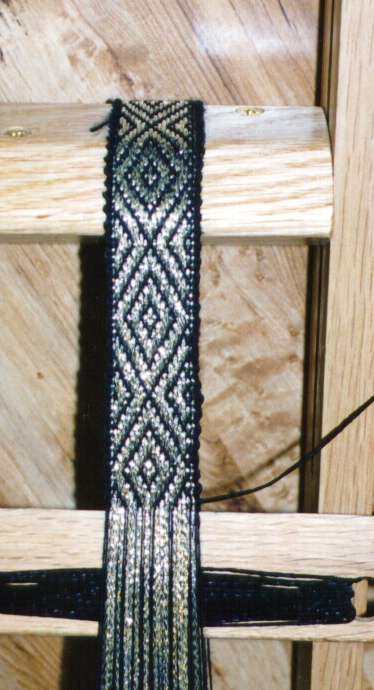Difference between revisions of "Inkle Weaving"
(New page: This type of weaving has been around for centuries. In early times, these narrow strips were used as belts, headbands, bag handles, or straps to tie and support things. When sewn together,...) |
|||
| Line 1: | Line 1: | ||
| + | [[Image:In-black inkleweaving.jpg|thumb|[[Black]] and [[Silver]] [[Inkle]] woven on a loom]] ]] | ||
This type of weaving has been around for centuries. In early times, these narrow strips were used as belts, headbands, bag handles, or straps to tie and support things. When sewn together, the strips could be turned into bags for gathering and carrying. These strips were also used aesthetically to decorate clothing. An inkle-woven strip has even survived from the first century AD. The actual origin of the style of weaving referred to as "inkle weaving" seems to have originated in many areas of the world, wherever textile arts have developed. For many centuries, this type of weaving was done on looms such as the bow loom, the forked-branch loom, or the back-strap loom. | This type of weaving has been around for centuries. In early times, these narrow strips were used as belts, headbands, bag handles, or straps to tie and support things. When sewn together, the strips could be turned into bags for gathering and carrying. These strips were also used aesthetically to decorate clothing. An inkle-woven strip has even survived from the first century AD. The actual origin of the style of weaving referred to as "inkle weaving" seems to have originated in many areas of the world, wherever textile arts have developed. For many centuries, this type of weaving was done on looms such as the bow loom, the forked-branch loom, or the back-strap loom. | ||
Revision as of 16:49, 6 February 2009
]]
This type of weaving has been around for centuries. In early times, these narrow strips were used as belts, headbands, bag handles, or straps to tie and support things. When sewn together, the strips could be turned into bags for gathering and carrying. These strips were also used aesthetically to decorate clothing. An inkle-woven strip has even survived from the first century AD. The actual origin of the style of weaving referred to as "inkle weaving" seems to have originated in many areas of the world, wherever textile arts have developed. For many centuries, this type of weaving was done on looms such as the bow loom, the forked-branch loom, or the back-strap loom.
For those familiar with Tablet (or Card) Weaving, inkle weaving is similar to producing a tablet-woven band using just two holes in opposite corners of the card and rotating in such a manner: one-half-turn forward, one-half-turn backward, repeat.
